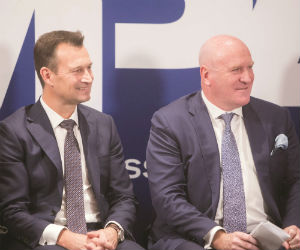Seven industry leaders debate the hot issues that could alter the future of broking

Seven industry leaders debate the hot issues that could alter the future of broking
Aggregators are in a tough position between brokers and banks. They have to juggle the interests of their members while also making sure they don’t alienate their lender partners.
The banking royal commission and the Productivity Commission have raised a number of issues that could drastically alter the structure of the industry, affecting how both brokers and aggregators conduct their business. While neither inquiry has released a final report, nor are the recommendations expected any time soon, the themes that have emerged were the main topics of conversation at this year’s MPA Aggregator Roundtable. Many brokers submitted questions about all the uncertainty resulting from the royal commission.
The seven aggregators involved – Choice, Connective, FAST, Outsource Financial, PLAN Australia, Specialist Finance Group and Vow Financial – participated in a lively debate on whether fee-for-service would come into play, how brokers should be dealing with heightened compliance and regulatory demands, and what the ‘best interests duty’ would really mean for brokers.
One of the highlights of the live-streamed event on 11 May was a debate on the merits of bank ownership of aggregators. While there was some obvious division among the group, both sides presented strong arguments for and against. You can read all about that on the following pages.
Another memorable moment was when the aggregators were stunned into silence by a prickly audience question: “You guys have been hiding through this process in my view. Why are aggregators not out in force defending our industry and your brokers?”
Mark Haron, director of Connective and deputy chairman of the Combined Industry Forum, took that in stride. He defended the work aggregators had been doing behind the scenes in collaborating and consulting with various parties to establish industry reforms that would safeguard the industry.
He acknowledged that perhaps they hadn’t been proactive enough about publicising their progress, but that they also couldn’t challenge every naysayer. He also said brokers had a responsibility to stay informed too, and he encouraged them to read, watch and listen to the information out there.
What it all comes down to is that in this climate neither brokers nor aggregators can afford to be bystanders.
As Vow general manager Clive Kirkpatrick said, “It’s not about defending [the industry]; it’s about promoting the great service that we provide to the community”.
We hope this discussion gives you a better idea of where your aggregator stands, what they’re doing to support you, and how you can advocate on behalf of the profession you love. If you want to watch the roundtable in full or read our latest coverage, visit mpamagazine.com.au.

Q: What is the future of upfront commissions and how likely is fee-for-service to be applied?
The fee-for-service debate has been thrust into the limelight recently as the Productivity Commission delves into whether or not this is a suitable method for paying brokers. The Productivity Commission is examining whether the fee-for-service model would remove potential conflicts of interest that arise from the current payment of broker commissions.
The commission has acknowledged, however, that it is considering whether this could decrease consumer demand for brokers and harm competition. In an interview with MPA in March, Productivity Commission chairman Peter Harris said that while the commission could recommend a fee-for-service model in its final report, it was well aware of the downsides.
“We’re not stupid; we wouldn’t necessarily go to a different arrangement just because it’s different,” Harris said. “It would have to be different and effective. … Can we do anything that’s better?
“We are considering doing something in the commission area; we didn’t say we are going to,” he said.
Tanya Sale, CEO of Outsource Financial, was keen to tackle this debate head-on at the roundtable.
“Everybody in the industry is getting tired of this,” she said. “I personally don’t believe fee-for-service will ever come into play in our industry. I think it’s a disaster we’re even talking about it.”
Sale referred to the problems faced by the industry post-GFC, when the majority of mortgages were being written through the major banks. With the royal commission flagging the banks’ bad behaviour, she questioned why the government would recommend a flat-fee model when it would squash competition and simply guarantee that all the mortgage business would return to the banks.
“That’s not what the government wants, that’s not what ASIC wants, and it’s certainly not what we want in our industry, so I don’t believe that will happen,” she said.
“I personally don’t believe fee-for-service will ever come into play in our industry” - Tanya Sale, Outsource Financial
William Lockett, managing director of Specialist Finance Group, said he understood why brokers were worried, but fundamentally the commission model worked well.
He also pointed to the fact that consumers were increasingly using brokers, which suggested they had no problem with how brokers were paid.
“If they’re remunerated that way and the consumer votes to use their services … why are we talking about it?” he said.
“At every stage during that process, the consumer has complete choice to not use them, and part of that process is full disclosure as to how they’re remunerated.”
Lockett said he was surprised that fee-forservice was on the table when the common understanding was that consumers wouldn’t, nor could they, pay for brokers up front.
“A fee-for-service model only supports the big major banks,” he said.
Sale said what was more likely to happen with commissions were “fine tweaks” as proposed by the CIF.
Anja Pannek, CEO of PLAN Australia, said the CIF’s proposed amendments, such as paying commission based on the facility utilised, net of offset, had addressed ASIC’s concerns around the risks of poor consumer outcomes.
She said it was clear that a flat fee disadvantaged competition and consumers who were making some of the most important decisions of their lives.
“All of us believe that the changes we’ll make [as the CIF] are very sensible, but we need to continue to look at how we can evolve the industry; it’s very important,” Pannek said.
Clive Kirkpatrick, general manager of Vow Financial, noted that while financial planners were paid upfront fees, the banking royal commission’s public inquiries had revealed that some planners’ behaviours still hadn’t changed.
“You would have to debate whether the remuneration actually drives behaviours or not. I think, as demonstrated in the financial planning industry, there are still poor behaviours notwithstanding changes to the way they’re remunerated.”
 Q: How do you think the revelations by the royal commission will impact the broking industry going forward? And any thoughts on how it will influence lending, investors and servicing requirements?
Q: How do you think the revelations by the royal commission will impact the broking industry going forward? And any thoughts on how it will influence lending, investors and servicing requirements?
The royal commission has raised some serious concerns about irresponsible lending, banks putting profits before customers, the poor verification of income and expenses, and conflicts of interest.
“What has come out of the royal commission, I don’t think anyone would have envisioned the level of misconduct that we’ve seen,” Lockett said.
As part of its investigation, he said, the royal commission had also looked at the third party channel, which the industry should welcome.
“Any changes or improvements that we get out of it, we fully endorse, but let’s not sugarcoat this. The royal commission was 98% or 99% damning [about] the banks and the banks’ conduct,” Lockett said. “I don’t know of any brokering firm that had 55,000 breaches in anti-money laundering.”
As for the direct ramifications for the industry, Haron said brokers were already seeing these in the form of banks constantly reviewing and amending their policies and adhering more strictly to them.
He said those changes would continue as the banks moved to overhaul how the Housing Expenditure Measure was calculated, which the royal commission had shown was not up to scratch.
“We, as an industry, unfortunately become the meat in the sandwich, or almost to a certain extent a little bit of salad that gets tossed aside. … But we will be bearing the brunt of a number of those changes,” Haron said.
The Connective boss anticipates the royal commission will blow out its time frames until next year, with a final report unlikely to be finalised prior to the next election.
That means brokers will be in limbo even longer. It also means the next government will be the one actually dealing with and enacting the recommendations in the report.
“As an industry, we have a lot of work to do to continue to talk about this with ASIC, with Treasury, with the government,” Haron said. “I think there will be a lot of opportunities, and I think the industry bodies will engage brokers significantly to ensure that we all start talking to our customers and making sure our customers know the impacts of [such things as] no commission, fee-for-service.
“Most consumers, I’m sure, would be happy to stand by their broker and support them and make sure that their local minister is aware of that as well.”
Brendan Wright, CEO of FAST, took a pragmatic approach to the royal commission and the impending changes.
“The regulatory times that we’re facing are just the reality of the business that we’re in. But there are clear learnings that have come out of FOFA and financial planning,” he said.
It’s all about being on the “front foot” as an industry around the insights coming from the ongoing inquiries, Wright said.
“For the brokers that are tuning in who are running businesses and are worried about the complexities of what’s going to happen next, I’d encourage you to talk to your aggregators, who are working with industry bodies; lenders, small, medium and large; and consumer advocacy groups through the CIF to take a leadership position.”
Wright added that the CIF’s aim was to deliver changes that would ensure brokers’ businesses and the industry remained viable and sustainable in the long term.
“Most consumers, I’m sure, would be happy to stand by their broker and support them” - Mark Haron, Connective
Pannek reiterated Haron’s point that brokers should steel themselves for the long haul. “I think for everyone it’s to realise that the royal commission and the Productivity Commission, this conversation, is going to continue for quite some time.”
That doesn’t need to be viewed as a negative thing. “As an industry it will give us an opportunity to pause and think about how we want to continue to develop standards,” Pannek said.
“[Brokers] want to do the right thing, and they honestly want to see our industry continue to grow and improve in terms of professionalism.”
 Q: Are accreditation policies robust enough, and what are you doing to support brokers to ensure they are sufficiently trained and educated for the job?
Q: Are accreditation policies robust enough, and what are you doing to support brokers to ensure they are sufficiently trained and educated for the job?
Most of the aggregators agreed that ensuring brokers were good at their jobs had to do with ongoing education and better mentorship.
“I think accreditation is one point, but ongoing education is far more important,” Kirkpatrick said.
“Once people achieve their accreditation, they must maintain a higher level of education, and I don’t think the current system of PD points is the best way.”
To ensure brokers were providing bestquality service, Choice Aggregation Services CEO Stephen Moore said the aggregator had developed educational content that suited all learning styles, so brokers could learn in a classroom, online in their own time, or in small groups or tailored individual sessions. The aggregator has also launched peer-to-peer sessions in which brokers share and learn best practices from one another, and these have been a resounding success, he said.
“It’s not just about formal education either, and I think that’s the key.”
Pannek’s organisation has also come up with a number of novel initiatives around education, including taking a group of PLAN members to Stanford University in California to learn world-leading business strategies. PLAN also hosted one of the largest business development training forums in aggregation earlier this year, with more than 600 members in attendance.
“[Brokers] want to do the right thing, and they honestly want to see our industry continue to grow and improve” - Anja Pannek, PLAN Australia
A successful broker is one who constantly thinks about the five C’s, Pannek said: customer first, customer focused, compliance obsessed, commercially focused, and committed to the industry.
As for accreditation, there was some debate around whether there should be a limit to the number of lenders brokers could be accredited with, and what should happen when they hadn’t written a loan with a specific lender in 12 months.
Sale questioned how confident these brokers would be in talking to a client and writing a loan for that product after so much time had passed, and whether they should even be allowed to sell it if they were unfamiliar with it.
“There’s a lot of pushback from the industry saying ‘why shouldn’t I be accredited with everyone?’ Well, I, for one, am not a fan of that,” Sale said.
Lockett agreed that if a broker hadn’t used a bank in a year, there needed to be some re-education and training to get them up to speed. “But that shouldn’t automatically give accreditation back for it only to happen again,” he said.
Haron said that aggregators had let the industry down when it came to maintaining a higher accreditation standard. If the banks could rely on the aggregators’ standards, broker quality and training, then a straightforward online product and policy test could be sufficient to prepare that broker to write with that lender again.
 Q: The Productivity Commission has recommended that a clear legal duty should be applied to brokers who work under bank-owned aggregators to act in the consumer’s best interests. What do you think of this and how will it affect how brokers operate?
Q: The Productivity Commission has recommended that a clear legal duty should be applied to brokers who work under bank-owned aggregators to act in the consumer’s best interests. What do you think of this and how will it affect how brokers operate?
“One of the most significant yet simple achievements that came out of the CIF was the definition of a good customer outcome,” Wright said.
But the CIF’s ‘good customer outcome’ was not the same as the legal definition of the ‘best interests duty’.
“It’s up to us to continue this leadership position around helping the Productivity Commission and the royal commission understand that a good customer outcome is a really practical, tangible and relevant way to describe what we’re trying to achieve,” he said.
However, Wright said that if the best interests duty did get applied, it should be adopted by the whole industry and not just a select group.
“We as an industry continue to lead towards a good customer outcome, and putting the customer first, as … the appropriate way to answer all the critics and questions coming from royal commission and Productivity Commission.”
“A good customer outcome is a really practical, tangible and relevant way to describe what we’re trying to achieve” - Brendan Wright, FAST
Haron said that while the best interests duty would be a recurring theme for the two commissions, the industry might be able to satisfy this duty by moving forward with the CIF’s good customer outcome definition and customer-first principles.
“The best interests standard that was developed through FOFA, that didn’t work, so we need to look at that and say: what can we learn?” Haron said.
“We’ll have what will be an industry best interests duty done through a customer-first focus.”
 Q: Vertical integration has been flagged by the Productivity Commission as an area of concern. How important is independence to your business?
Q: Vertical integration has been flagged by the Productivity Commission as an area of concern. How important is independence to your business?
The Productivity Commission’s draft report into competition in the financial system cited the concerns of consumer advocacy groups that vertical integration could limit an adviser’s objectiveness and the options and information available to consumers.
“The reality is that most consumers are only shown a limited amount of the market, and the broker often receives incentives to act as a sales channel in a way that increases the significant levels of concentration in the mortgage market,” consumer advocacy group CHOICE said in its submission to the commission.
At MPA’s roundtable, there were some polar opposite views on whether bank ownership had a place in aggregation and whether it should be tolerated.
Moore said NAB’s ownership of Choice Aggregation Services had made it a better business. “The level of investment that we’ve been able to make to directly benefit brokers and the people we’ve been able to put on would not have been possible without NAB’s support.”
“[If ] you put the customer first, I’m not really sure if it matters who the aggregator is owned by” Clive Kirkpatrick, Vow
He argued that both brokers within the Choice network and those outside of it had benefited from NAB being a vocal supporter of the channel.
“I think ownership – you know, ‘skin in the game’, in other words – has been a key reason behind that, and unfortunately we can’t say that for all lenders at the moment.”
Moore ran the stream at the CIF on disclosure of ownership, for which the group has since proposed clearer guidelines. He said the most important thing was for brokers to be transparent about ownership so customers were well informed and able make their own decisions.
However, Lockett, of Specialist Finance Group, didn’t agree.

“My firm view is that lenders should play no part in ownership of an aggregator,” he said, something that has been reinforced by the revelations coming out of the royal commission, which have highlighted the conflicts that arise from vertical set-ups in financial advice.
“Banks can still firmly support the third party channel as a prime business partner. There are many ways that you can give support; you don’t have to have ownership. And it is a clear conflict of interest and a perceived conflict of interest that I don’t think should be in our industry.”
Moore countered that the best way to manage conflicts was through disclosure and clarity, but he agreed to disagree with Lockett.
Kirkpatrick, of Vow, provided a balanced perspective.
“Aggregators need capital to provide services to minimise the costs back to the broker. [Having] a part shareholder that’s a financial institution providing that capital so you’re providing better services is great for the broker and therefore the customer.”
The broker’s job is to put the customer first and match them with the most suitable product for their needs, regardless of who owns their aggregator, he said.
“[If ] you put the customer first, I’m not really sure if it matters who the aggregator is owned by. The broker, even though they’re not allowed to be called independent, actually have independence of thought; they provide an independent view and independent advice on what is best for the customer at that point in time.”
Sale, from Outsource Financial, said the most important thing that her independent aggregator had championed for years was full transparency.
“I think that’s where this best interests duty comes into play, because banks are owning aggregators, whether it’s 100% or partially. All I’ve ever wanted for the industry and the consumer is that full transparency. And that’s what we’ve fought for as independent aggregators for a number of years,” she said.
Sale said that she wanted to see ownership clearly stated on all compliance documents and websites to remove the “grey cloud”.
“We’ve got to remove those muddy waters and make it fully transparent so that the consumer can make an educated decision.”

.JPG)


